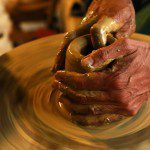Saul of Tarsus was an intransigent Roman citizen, zealous in his persecution of early Christians in the first century. At the height of his fervor, Saul was blinded and knocked from his horse by a visitation from Jesus, who appeared in a bright light. After three days, he regained his sight and rose to find his deeper self revealed as Paul, the apostle, who spread the gospel of Jesus. He became the very thing he had persecuted.
Falling tends to break us open, often against our will. Once fallen off our horse, we have the chance to accept the humanity of others, which we’re suddenly not so far from. It opens us to the fragile acceptance that “there but for the grace of God go I.” So be careful what you so sharply condemn, for you just might become it.
Saul fell into an opposite, though equally zealous, calling. More often, our tripping into what we condemn isn’t that exalted or extreme. A friend of mine who was highly principled, absolute in his code of ethics, once cut off a mutual friend completely, because he learned that friend had lied. It wasn’t even to him. But he couldn’t tolerate any falsehood in his relationships. Almost a decade later, my principled friend fell into hard times. His wife had died, he’d lost his job and, desperate for work, he lied on his resume, saying he’d resigned. I learned all this because he wanted me to be a reference for him, which I was happy to do. But in the process, he confessed to me that he had become what he had condemned. It humbled him.
It made us both suspend our judgment about such things, because in real life, good people suffer and find themselves being less than their best selves. But how do we respond to this? Do we turn our backs on everyone who is less than their best? Do we stone them? Or do we love them by holding a mirror to their vulnerability, showing them who they truly are until they can heal? Just because someone lies when in pain doesn’t make him incapable of truth, and when someone says something hurtful, it doesn’t mean she’s now incapable of love. Although, living in the lie and hiding in being hurtful can keep us from our true nature.
A Question to Walk With: Describe a time when you felt judged without compassion and how it felt to be reduced to the one mistake you made. How did this affect the relationship?
Last month, Atria published my new book, The One Life We’re Given: Finding the Wisdom that Waits in Your Heart. To make the most of being here, we’re required to learn when to try and when to let go. This is our initiation into grace. The gift and practice of being human centers on the effort to restore what matters and, when in trouble, to make good use of our heart. No one quite knows how to do this, but learn it we must. There is no other way. By fully living the one life we’re given, we’re led to the wisdom that waits in our heart. The above piece is an excerpt from the book.














